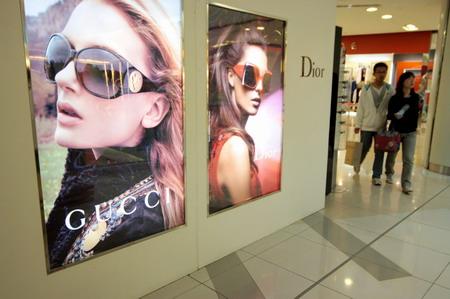
Advertising boards for luxury brands at a department store in Beijing. Bain & Co says China remains the fastest-growing luxury goods market in the world, with a sales volume of 68.4 billion yuan ($10.27 billion) this year. [China Daily]
Dressed in an alluring black dress and sporting a luminous pearl necklace, Holly Golightly stares in wonderment at the world behind the window of Tiffany's emporium on Fifth Avenue in New York City.
It's an iconic image from the 1961 movie Breakfast at Tiffany's that has drawn many young ladies to its jewelry displays. The role of the country girl-turned-socialite was made famous by Audrey Hepburn, who said of the store, it was "the best place in the world, where nothing bad can take place".
Founded by Charles Lewis Tiffany and Teddy Young in 1837, the luxury brand is still going strong, with outlets worldwide from Bogota to Dublin.
Now Tiffany's Chinese fans can appreciate the luxury designer at home after it unveiled its 2011 jewels and diamonds in Beijing in October - the first time the brand has unveiled a major new collection outside the United States.
Although it is a first for Tiffany's, it is part of a trend for global luxury groups. Premium brands are making great efforts to tighten their ties with Chinese clients as they realize that the Middle Kingdom is driving the development of their industry sector, which is experiencing one of the fastest growths in the country.
A study from American consultancy Bain & Co suggested that the recovery of the luxury market was now in full swing with hugely improving sales of high-end goods such as designer handbags and watches.
China remains the fastest-growing luxury goods market in the world, with a sales volume of 68.4 billion yuan ($10.27 billion) and an expected increase of 30 percent this year over last year's takings.
"We aim to let Chinese customers become more familiar with the connotation and history of our brand through this activity, which brings Tiffany's closer to its Chinese buyers," Michael J. Kowalski, chairman of Tiffany & Co, told China Daily.
In the second quarter of 2010, Tiffany's witnessed its fastest growth in China, with a 27 percent increase year-on-year.
"Sales in the Asia-Pacific region, led by China, could increase by a mid-20s percentage for the whole year," Kowalski said.
Makers of luxury brands that want to get closer to Chinese customers are legion. Reuters reported that the Italian luxury brand Prada said it may launch an initial public offering (IPO) on the Hong Kong stock market if markets recover next year.
Prada has shelved a flotation three times over the last decade and finally chose Hong Kong as the location of its overseas IPO.
During the coming Chinese Spring Festival on Feb 3, the Parisian luxury department store Printemps will offer discounts and organize youngsters wearing traditional Chinese costumes to give traditional red envelopes to Chinese customers to mark the occasion at its 45,000-square-meter location on Boulevard Haussmann.
"We always attach great importance to Chinese customers' sensitivities and we prepare a holiday surprise for our Chinese clients every year," Chief Executive Paolo de Cesare said.
John Galliano, designing director of Dior, together with film director David Lynch and French actress Marion Cotillard, came to Shanghai to advertise Dior's 2010 spring and summer collection earlier this year.
The initiative strengthened the identity of the French fashion house in the city, which is regarded the most modern and stylish place in China.
In September, French fashion label Hermes opened its first boutique for its new brand called Shang Xia (which means topsy-turvy in Mandarin) - a strategy that highlights China's growing importance to the luxury goods company.
The store, an example of minimalist chic, offers clothing, home furnishings, shoes and tableware - a collection made from traditional Asian materials such as bamboo, cashmere and porcelain.
Shang Xia is looking for strong growth in China, a country where Hermes has lagged behind its competitors but which it sees as a principal market.
"The idea is to bring the Hermes philosophy to China, to create a Chinese Hermes," Chief Executive Patrick Thomas told Agence France-Presse.
1 2 Next




